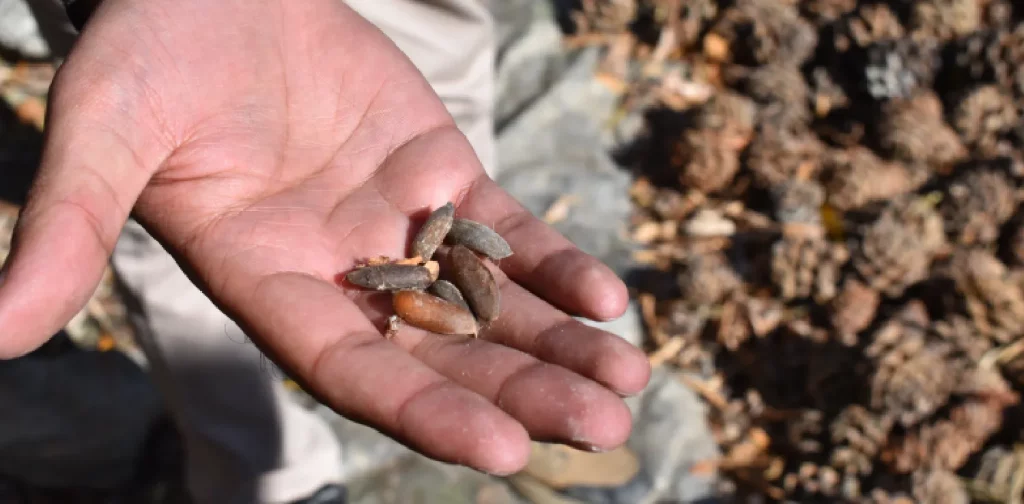Empowering Local Communities to Revitalize Chilgoza Forests in Pakistan

Chilgoza pine nuts. | Photo: Faizul Bari/IUCN.
Forests are vital for the planet and the economy. They provide habitats for biodiversity, help with carbon emission reduction, and support local communities’ livelihoods and income. Therefore, sustainable forest management that prevents exploitative and destructive activities in the forest is crucial. In Pakistan, The Restorative Initiative has been working with local communities to restore Chilgoza forests.
Chilgoza Forests in Pakistan
Chilgoza pine (Pinus gerardiana) is a native pine tree in northern Pakistan. The trees grow between 2,000 and 3,350 m above sea level, particularly in the Hindukush-Karakoram-Himalaya region of North Pakistan. The Chilgoza nuts are in demand locally and internationally, becoming an important source of income for the local communities. Additionally, Chilgoza forests also host important biodiversity and support vital ecosystem services.
Unfortunately, the forest has been experiencing severe cases of degradation. Illegal wood chopping, uncontrolled grazing, and overexploitation have disrupted the regeneration process and productivity of the trees. According to the Food and Agriculture Organization (FAO), only 27% of the total 4,579,000 hectares of forest was productive in 2020.
Sustainable forest management is essential to halt forest degradation and mitigate the impacts of climate change. The IUCN, the FAO, and the UNEP launched The Restorative Initiative (TRI) in Pakistan to empower local communities with the knowledge and skills necessary to manage Chilgoza forests.
The Restorative Initiative in Pakistan
Starting in 2018, TRI’s project in Pakistan aims to revitalize the Chilgoza forest ecosystems and protect local communities’ livelihood through capacity building. The project works with the Pakistan Forest Department to equip local communities with knowledge and skills in science-based management, sustainable harvesting techniques, and improved post-harvesting methods.
TRI Pakistan has also established the Chilgoza Forest Protection and Conservation Committees (CFPCC), which consists of community members. In 2020, 14 registered CFPCCs adopted several measures to support the management, protection, and restoration of Chilgoza forests. This includes deciding the limit of pine cone harvesting within permitted seasons, banning large-scale commercial harvesting, and establishing community monitoring and regulations.
Sham Su Rabbi, General Secretary of the Chilghoza Forest Protection Committee, said, “After receiving training on forest fire control, we now actively assist the Forest Department in both forest fire control and forest mapping efforts. In the past, we were unaware of the significance and the centuries it takes for an oak forest to thrive, but with the project, our capacities have been built, and we have more knowledge and techniques on managing our forest.”
Local Communities Empowerment
By 2021, TRI Pakistan has established four pine nut processing units capable of processing 60,000 kg of pine nuts. It equals PKR 90 million (USD 513,000) worth of income across districts in Pakistan. Empowering local communities with skills for sustainable forest management can further strengthen their self-sufficiency and resilience. In this case, the capacity building done by TRI Pakistan has enabled new job opportunities, better systems, and improved income for local communities in the region.
Editor: Nazalea Kusuma

Co-create positive impact for people and the planet.
Amidst today’s increasingly complex global challenges, equipping yourself, team, and communities with interdisciplinary and cross-sectoral insights on sustainability-related issues and sustainable development is no longer optional — it is a strategic necessity to stay ahead and stay relevant.

Kresentia Madina
Madina is the Assistant Manager of Stakeholder Engagement at Green Network Asia. She holds a bachelor’s degree in English Studies from Universitas Indonesia. As part of the GNA In-House Team, she supports the organization's multi-stakeholder engagement across international organizations, governments, businesses, civil society, and grassroots communities through digital publications, events, capacity building, and research.


 Indian Gig Workers Push Back Against 10-Minute Delivery Service Strain
Indian Gig Workers Push Back Against 10-Minute Delivery Service Strain  Call for Governance: Grassroots Initiatives Look to Scale Efforts to Conserve Depleting Groundwater
Call for Governance: Grassroots Initiatives Look to Scale Efforts to Conserve Depleting Groundwater  Integrating Environment, Climate Change, and Sustainability Issues into Education Systems
Integrating Environment, Climate Change, and Sustainability Issues into Education Systems  Finally Enforced: Understanding the UN High Seas Treaty
Finally Enforced: Understanding the UN High Seas Treaty  Risks and Opportunities of Submarine Communication Cables for Sustainable Development
Risks and Opportunities of Submarine Communication Cables for Sustainable Development  Rising Attacks and Violence Against Land and Environmental Defenders
Rising Attacks and Violence Against Land and Environmental Defenders